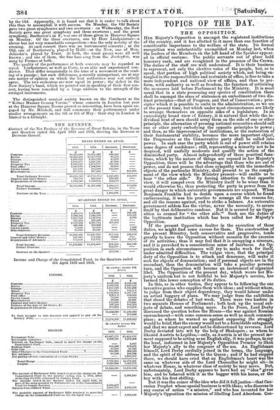The two Philharmonic Societies have had concerts this week ;
both of them very good, and very successful ; and very like each other, mere- over, in some principal points. The most remarkable resemblance was the absence of novelty ; a feature consistent with the practice of the Old Society, but rather at variance with that of the New ; one of its professed objects being to provide those novelties alleged to be so much neglected by the Old. APparently, it is found out that it is easier to talk about this than to accomplish it with animas. On Monday, the Old Society gave two great symphonies and two overtures : on Wednesday, the New Society gave one great symphony and three overtures ; and the great symphony, Beethoven's in F, was one of those given in Hanover Square on Monday. Of the three overtures, one by Herr Lindpaintner-a clever but not very remarkable composition-was the only novelty of the evening. At each concert there was an instrumental concerto ; at the Old, one of Beethoven's, played by Halle-at the New, one of Men- delssohn's, played by Ernst. At both, the vocal pieces were all well known ; and one of them, the fine bass song from the Zauberfiiite, was sung by Formes at both. The quality of the performance at both concerts may be regarded as equal. Lindpaintner, as well as Costa, is an able and experienced con- ductor. They differ occasionally in the time of a movement or the read- ing of a passage ; but such differences, generally unimportant, are at any rate matter of opinion on which the best authorities may not entirely agree. The two orchestras are now equal in power ; the defect in the t'iew Society's band, which we pointed out in speaking of their first con- cert, having been remedied by a large addition to the strength of the stringed instruments.



























 Previous page
Previous page